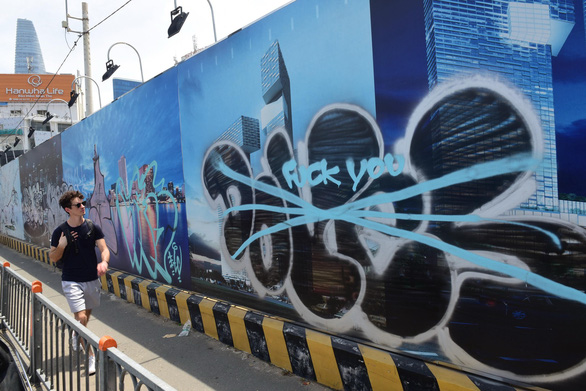Editor’s note: Ryan Patey writes to Tuoi Tre (Youth) newspaper to express his perspective on true, meaningful graffiti compared to pointless, illegal drawings, which are also popping on all over many public places in Vietnam’s big cities such as Hanoi and Ho Chi Minh City.
As someone who has a love for graffiti, and the culture and history around it, I definitely feel there is an important difference among the intentions of graffiti artists.
Graffiti can be considered as an art when it is drawn on corporate or public property to share a meaningful message or an artistic idea.
Meanwhile, there are many people who vandalize culturally important spaces just to let people know they were there or that they felt affection towards another person.
In Canada, graffiti is most popular in cities such as Toronto, Montreal, and Vancouver.
While I lived in Montreal, I fell in love with many pieces that decorated walls of buildings that would have been vacant and bland otherwise.
In fact, the city of Montreal seems to have a good relationship with graffiti artists as it hosts festivals each year to celebrate the culture and provide spaces for artists to create new works.
Under the Criminal Code of Canada, the creation of graffiti is considered vandalism if it is drawn on a property without permission of the owner. Vandals can be charged with "mischief under or over CAD$5,000."
Despite that, as far as I know, numerous businesses have offered their walls and other spaces to artists to create something for the neighborhood.
In most cases, embracing the artists and working with them has been beneficial to everyone involved, including the public.
I do feel the difference between such acts and those of a person simply looking to leave their name or a relationship status somewhere is significant.
Defacing a cultural landmark or something else beloved by countless people for the sake of declaring affection to another seems selfish and ignorant when you think about everything else the monument has withstood over time.
A thousand years from now, people will still be travelling to see important landmarks around the world. Chances are no one will talk of the romance between two people whose names were painted in graffiti on a monument’s wall, but plenty of people will remark on the selfish couple or person that scarred the space they came to see.
Sure, leaving your mark on the world is something most of us wish to do, but it takes a somewhat careless person to decide to leave it on top of the work of another that is already significant to many.
Like us on Facebook or follow us on Twitter to get the latest news about Vietnam!


















































